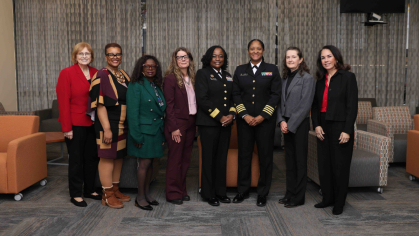Change Makers: Rutgers School of Social Work's Podcast Puts a Spotlight on Those Committed to Building a Better Future
As part of our commitment to leading for justice through innovation, excellence, collaboration, and community, Rutgers School of Social Work launched a new podcast, Toward a More Just Future, last spring. The series explores a variety of topics pertinent to social workers and students working towards progress. Season one, “In the Spotlight,” focused on change makers and was hosted by Marla Blunt-Carter, Assistant Professor of Professional Practice at Rutgers School of Social Work.
Blunt-Carter spoke with voices in politics to understand what change is, how it unfolds, and how more people can get involved. “When conceptualizing the first season of our podcast, we wanted to create a space for dialogue on change,” said Blunt-Carter. “Although our main audience is comprised of social work students and practitioners, we wanted these important conversations to be approachable and accessible to everyone, no matter where they are in their education or career. Change can, and should, happen at the micro, mezzo, and macro levels. Our goal was to convey that creating change at any level can be difficult, but it can be done by anyone.”
Season one brought three internationally known politicians and change makers into conversation with Blunt-Carter. Congresswoman Lisa Blunt Rochester, the first African American and first woman to represent Delaware in the U.S. House of Representatives, kicked off the season. Congresswoman Blunt Rochester serves as an Assistant Whip for House Leadership and sits on the House Committee on Energy and Commerce. Sarah McBride, an activist and elected official who is a Delaware General Assembly member, was in conversation with Blunt-Carter in the second episode. McBride is the first transgender state senator in the country, making her the highest-ranking transgender official in United States history. Rounding out the first season was a conversation with Valerie Biden Owens, a media consultant, political strategist, and the sister of President Joe Biden. During her fifty-year career, Biden Owens ran numerous political campaigns at local, state, and national levels.
Read on for some of the first season’s highlights.
Lisa Blunt Rochester on creating change through social work:
“I actually am the product of a social worker: our dad, a Rutgers grad. I am the sister of a social worker: my sister Marla. And I'm the mother of a social worker. My daughter, Alyssa, also graduated with a Master of Social Work from Rutgers. I watched you guys, from both a micro and a macro level, deal with social work … There are so many different ways in which you can have an impact on people's lives and improve their quality of life. As a caseworker, I still remember over 30 yearsago, people who, because I was advocating for them with the Social Security Administration, got their benefits. And they were homeless. That matters. That one-on-one matters.
Social workers can run for office. Social workers can help make sure that people with the right vision, the same mission, the same goals, get elected … On more personal side, I would say as an individual, make sure you know your why. It helps to keep you going when the storms come. You can stay rooted in that why.”
Sarah McBride on becoming a Delaware State Senator:
“I was incredibly lucky. I was raised in a loving family, a supportive
family, a progressive family, and I had a world of possibilities before me because of that luck and that privilege. But buried deep inside of me was a struggle with my gender identity, a struggle with who I am, and a struggle with how I fit into this world. And from a really early age I was dealing with the tension between who I was and what everyone thought I was between who I wanted to be and what seemed possible. And so, I kept my gender identity buried deep inside.
I really found an escape in reading. And in particular, in reading history. But more than an escape, I found hope in reading those history books because, as much as I was struggling with how I fit into this world, I saw in those history books that the story of every chapter was the story of advocates, activists, citizens, and a small group of courageous elected officials who would band together to deepen our sense of equality and justice for more and more people who for too often had been pushed to the margins and into the shadows. So I found hope in those history books, and I saw in reading those stories, that politics was the place where you could make the most amount of change for the most number of people in the most number of ways possible. And I thought, perhaps, if I could make a change in my community, if I could build a world where more people could live fully and freely, whether there's someone like me or someone else, that perhaps that would be a fulfilling life, even if I couldn't live an authentic life. But as I grew up, I saw that the only way to live a fulfilling life is to live at your core an authentic life.”
Valerie Biden Owens on how she gained her confidence:
“Confidence is the number one prerequisite for success in life. And I had the great advantage of having a big brother who told me from the beginning that whatever he could do I could do better. He said I was smarter than he, I was more athletic than he. Whatever it was, he said there was nothing that he could do that any woman couldn't do, but particularly me.
Confidence is not part of one's DNA. I didn’t actively take notes to learn how to be confident. I hung around with my brother. He told me I could be anything that I wanted to be. And my parents said, ‘you can be anything.’ They were always encouraging. It’s wonderful to have a mentor, somebody who, when you're down, who says, ‘come on, you can do this.’ Confidence is not something that’s part of your DNA. It's something really hard to get ahold of. Some people get it a little bit more easily or a lot more easily than others. And look, Marla, once you have it doesn't mean it stays. I don't know about you, but sometimes I just feel it slipped right through my fingers.”
Learn more about the School of Social Work’s podcast and listen to the full episodes of Toward a More Just Future.



